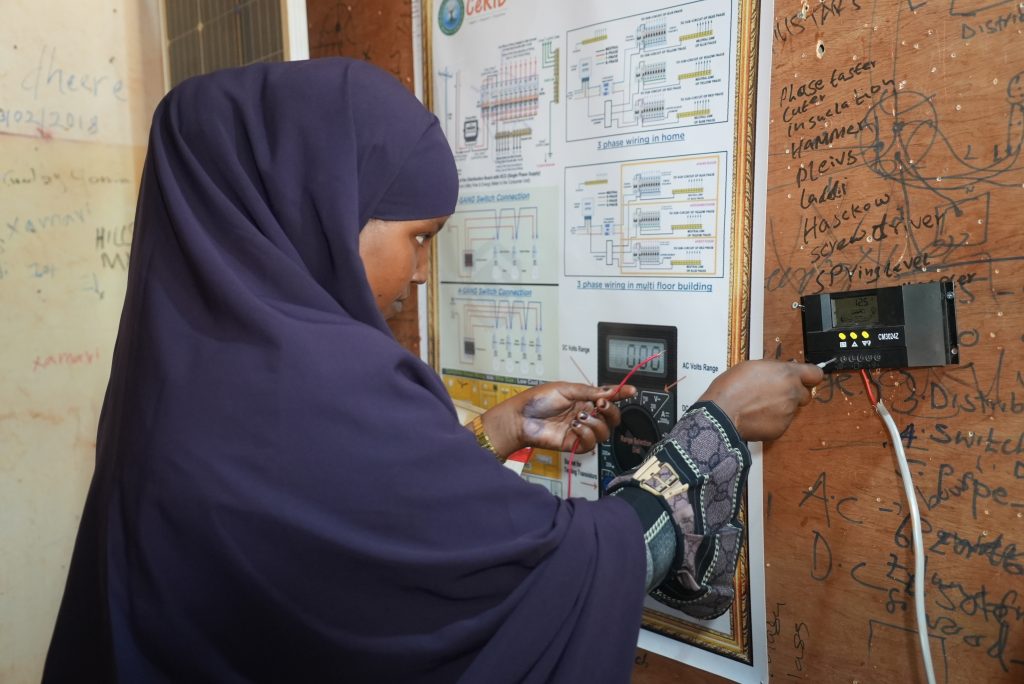On a Sunny Saturday afternoon, a big college bus, painted in white, drives through a dusty, rough road and slowly approaches a massive gate on the outskirts of Baled-Hawa, a rapidly expanding border town in southern Somalia.
Once the gate is opened and the bus stops, dozens of students, many young girls and boys, disembark. Welcome to Sayid Mohamed Technical Education College (SaMTEC), the only vocational training college in the Gedo region and one of the best in Somalia.
The technical training college is one of a handful of centres where Somali youth, who comprise almost 75% of the country’s population, are taught skill-based training.
Despite the soaring heat, they quickly settle into their respective classes, some changing into their unique uniforms before starting their various classes for the day.
“I never thought I would be able to fix electrical devices,” said 25-year-old Kowsar Mohamud as she disassembled an electrical socket. She is one of three female students learning electrical skills—a rare skill for women in a male-dominated field in Somalia.

“When I started the training a few months ago, many of my friends laughed at me and wondered whether I was crazy because women are not associated with anything electrical in Somalia”, she added.
Kowsar says she can now use the skill she learned at home and as an entrepreneur as she flips through different electrical devices, connecting and disconnecting them.
She represents the best example of how the Adventist Development and Relief Agency (ADRA) empowers youth in Somalia. This resilient nation has battled its share of challenges following decades of devastating conflict and a severe humanitarian crisis.
Through the Strengthening Education and Training in Somalia (SET-2) project funded by the European Union, ADRA Somalia has been able to offer wide-ranging support in different areas of Education.
“The main objective of this Entrepreneurship-based technical training skills (EB-TVET) is to bridge the gap between the job seeker and the employer”, says Adan Sahane, ADRA’s deputy program manager for Education. “So we want to make sure that whoever gets this training is quickly absorbed by the market”, he adds.
As a result, hundreds of youth are undertaking various trainings, from electrical engineering to mechanics to sewing machines and using Hina to create designs and decorations for women in this training institution in Baled-hawa.
The SET-2 project also extends a lifeline to children with disabilities, ensuring they are not left behind. Beder Primary School in Kismayo has dedicated classes for children with disabilities, who are now taught from grade one to the final grade.
“Thanks to the support we received from ADRA Somalia, we have managed to create classrooms and offer assistive devices and specially trained teachers to learners with different forms of disabilities in this school,” says Ibrahim Abdullahi, the head teacher for Beder Primary School in Kismayo. “In fact, the grade eight students are preparing to sit for their final national exams in a few months’ time,” he adds.
Recognizing that Education is not a one-size-fits-all endeavour for all, the SET 2 project has developed a component that is targeted at helping children who did not get an opportunity to join the school at a tender age. The program, known as Accelerated Basic Education (ABE), offers pupils a flexible alternative system with its own condensed curriculum. “I support my mother in running her small tea shop in the morning hours, and I join the class in the afternoon,” said 16-year-old Rahma Ali Mohamed, who joined the female student’s ABE class on December 20 in Mogadishu. “I never thought I would be able to get an opportunity like this. I thought of joining private institutions, but as you know, that requires financial resources, which my mother cannot meet now,” she added.
Rahma is among four thousand students currently enrolled in the ABE program across Somalia. In recent years, ADRA Somalia, in collaboration with Education stakeholders, has managed to develop a comprehensive curriculum that helps students cover the eight-year primary course in four levels.
In many ways, Somalia is slowly recovering from decades of civil war and trying to catch up in many fields, including Education. An estimated 2.2 million children are still out of school due to the conflict, climatic challenges, and lack of resources. Through the funding of the EU, ADRA Somalia invests in developing school infrastructure through capitation grants and developing a model school with complete school facilities. More than 30 such schools have been completed across Somalia.
The EU and ADRA Somalia’s collaboration in improving Education in Somalia is not just about statistics and funding figures. It’s about Kowsar, the girl who dismantles light switches, Rahma, the 16-year-old who can catch up in her Education while supporting her mother through the ABE program and many of the disabled students in Kismayo who are today able to access Education. It’s a story of hope, resilience, and the transformative power of Education. As Somalia charts a new course, the EU and ADRA stand beside them, ensuring that every child can learn, grow, and contribute to a brighter future for themselves and their nation.

